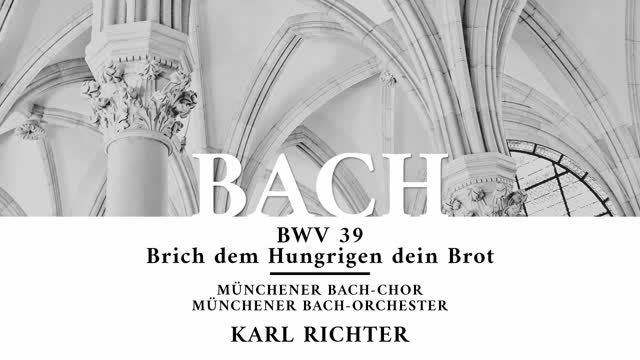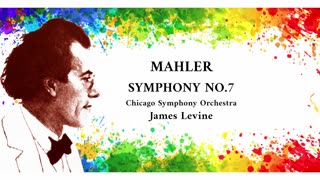Premium Only Content

Cantata BWV 39, Brich dem Hungrigen dein Brot - Johann Sebastian Bach "Karl Richter"
🎻 Enjoy the music. Please follow, like & comment, this is immensely appreciated 🎻
Composition Year: 1726 in Leipzig
First Performance: 1726-06-23 in Leipzig
Dedication: 1st Sunday after Trinity
Recorded: München, Herkulessaal, 1&3/1974; 1/1975
Recording quality: High
Performers:
Edith Mathis - Sopran • Anna Reynold - Alt • Dietrich Fischer-Dieskau - Bas • Münchener Bach-Chor • Münchener Bach-Orchester • Karl Richter - Conductor
~
Prima parte
1. Chorus: Brich dem Hungrigen dein Brot
2. Recitativo (bass): Der reiche Gott
3. Aria (alto): Seinem Schöpfer noch auf Erden
Seconda parte
4. Aria (bass): Wohlzutun und mitzuteilen vergesset nicht
5. Aria (soprano): Höchster, was ich habe
6. Recitativo (alto): Wie soll ich dir, o Herr
7. Chorale: Selig sind, die aus Erbarmen
Work:
Johann Sebastian Bach composed the church cantata Brich dem Hungrigen dein Brot ("Break with hungry men thy bread" or "Give the hungry ones thy bread", BWV 39, in Leipzig and first performed on 23 June 1726, the first Sunday after Trinity that year. Three years earlier, on the first Sunday after Trinity in 1723, Bach had taken office as Thomaskantor and started his first cycle of cantatas for Sundays and Feast Days in the liturgical year. On the first Sunday after Trinity in 1724, he began his second cycle, consisting of chorale cantatas. The cantata Brich dem Hungrigen dein Brot is regarded as part of Bach's third cantata cycle, which was written sporadically between 1725 and 1727.
~
The text of the cantata is taken from a 1704 collection of librettos from Meiningen, many of which had been set to music in the cantatas of Bach's distant cousin Johann Ludwig Bach, Kapellmeister at Meiningen. The librettos have been attributed to his employer, Duke Ernst Ludwig von Sachsen-Meiningen. The symmetrical structure of seven movements is typical for this collection: the opening quotation from the Old Testament, followed by a recitative and an aria; then the central quotation from the New Testament, followed by an aria and a recitative, leading into the final chorale. Theme of BWV 39 is an invocation to be grateful for God's gifts and to share them with the needy.
~
Extended info on Bach and his work: https://www.bach-cantatas.com/
***
If you have the means and desire to contribute to this channel, you can Buy Me a Tea - https://ko-fi.com/classicalmusicpd
***
ATTRIBUTION
Music contained in this video is licensed to Archiv Produktion, Germany.
-
 1:20:22
1:20:22
Classical Music P.D.
1 year agoSymphonie No.7, in E minor - Gustav Mahler 'Levine'
124 -
 18:22
18:22
Neil McCoy-Ward
2 hours agoThe 🇨🇴 Colombian President Just Learned The HARD WAY!!! (Another Win For The USA 🇺🇸)
13.3K8 -
 1:56:04
1:56:04
TheDozenPodcast
17 hours agoMass deportations, Islamists, Saving the UK: Nick Tenconi
25K18 -
 35:24
35:24
Survive History
22 hours ago $9.10 earnedCould You Survive in a Cavalry Regiment During the English Civil War?
90.6K9 -
 28:15
28:15
Degenerate Plays
17 hours ago $4.48 earnedTwo Birds' Secret Meeting - Gotham Knights : Part 26
73.1K6 -
 12:29
12:29
Mr. Build It
6 days agoWish I Knew This Before I Started Building It
69.1K26 -
 2:03:57
2:03:57
Megyn Kelly
2 days agoNew Trump Derangement Syndrome, and How CNN Smeared a Navy Veteran, w/ Piers Morgan & Zachary Young
163K189 -
 10:05
10:05
DIY Wife
3 years agoHow We Flip Old Furniture For Profit!
89.6K63 -
 2:14:54
2:14:54
TheSaltyCracker
14 hours agoTrump Goes Gangster ReeEEeE Stream 01-26-25
223K379 -
 4:42:13
4:42:13
Due Dissidence
1 day agoTrump Calls To "CLEAN OUT" Gaza, Swiss ARREST Pro-Palestine Journalist, MAGA's Hollywood Makeover?
100K127